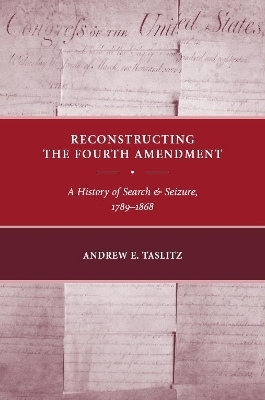
Reconstructing the Fourth Amendment
New York University Press (Verlag)
978-0-8147-8263-7 (ISBN)
- Lieferbar (Termin unbekannt)
- Versandkostenfrei innerhalb Deutschlands
- Auch auf Rechnung
- Verfügbarkeit in der Filiale vor Ort prüfen
- Artikel merken
The modern law of search and seizure permits warrantless searches that ruin the citizenry's trust in law enforcement, harms minorities, and embraces an individualistic notion of the rights that it protects, ignoring essential roles that properly-conceived protections of privacy, mobility, and property play in uniting Americans. Many believe the Fourth Amendment is a poor bulwark against state tyrannies, particularly during the War on Terror.
Historical amnesia has obscured the Fourth Amendment's positive aspects, and Andrew E. Taslitz rescues its forgotten history in Reconstructing the Fourth Amendment, which includes two novel arguments. First, that the original Fourth Amendment of 1791—born in political struggle between the English and the colonists—served important political functions, particularly in regulating expressive political violence. Second, that the Amendment’s meaning changed when the Fourteenth Amendment was created to give teeth to outlawing slavery, and its focus shifted from primary emphasis on individualistic privacy notions as central to a white democratic polis to enhanced protections for group privacy, individual mobility, and property in a multi-racial republic.
With an understanding of the historical roots of the Fourth Amendment, suggests Taslitz, we can upend negative assumptions of modern search and seizure law, and create new institutional approaches that give political voice to citizens and safeguard against unnecessary humiliation and dehumanization at the hands of the police.
Andrew E. Taslitz is Professor at Howard University School of Law. He is the author of five books, including Constitutional Criminal Procedure and Rape and the Culture of the Courtroom (NYU Press).
PrefaceAcknowledgments 1 Plugging into the Fourth Amendment's Matrix PART I: POLITICAL VIOLENCE AND THE ORIGINAL FOURTH AMENDMENT 2 Violence as Political Expression 3 The Quantity and Quality of Evidence 4 Modern Implications I: Peoplehood and Interbranch Responsibilities 5 Modern Implications II: Precedent and Political MeaningPART II: THE RECONSTRUCTED FOURTH AMENDMENT 6 Expressive Violence and Southern Honor7 Slave Locomotion 8 Mobility's Meaning for the South 9 Mobility's Meaning for the North 10 Privacy and Property 11 Civil War and Reconstruction 12 Law on the Street NotesIndex About the Author
| Erscheint lt. Verlag | 1.10.2006 |
|---|---|
| Verlagsort | New York |
| Sprache | englisch |
| Maße | 153 x 229 mm |
| Themenwelt | Recht / Steuern ► EU / Internationales Recht |
| Recht / Steuern ► Öffentliches Recht | |
| Recht / Steuern ► Rechtsgeschichte | |
| ISBN-10 | 0-8147-8263-9 / 0814782639 |
| ISBN-13 | 978-0-8147-8263-7 / 9780814782637 |
| Zustand | Neuware |
| Informationen gemäß Produktsicherheitsverordnung (GPSR) | |
| Haben Sie eine Frage zum Produkt? |
aus dem Bereich


